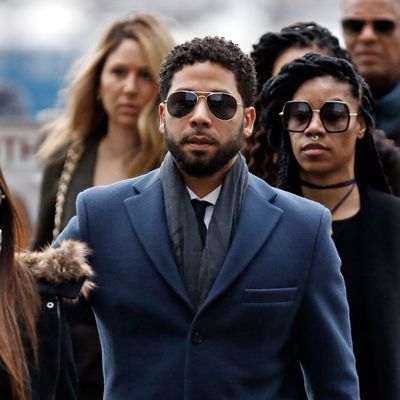
Jussie Smollett is off the hook. Until Tuesday, the Empire actor was facing felony charges on several counts of disorderly conduct stemming from allegations that he lied to police. Two white men, he claimed, attacked him on January 29 in Chicago and wrapped a noose around his neck and poured a chemical substance on him. “This is MAGA country,” one allegedly said. Smollett filed a report. After investigating, though, Chicago police accused the actor of lying. No surveillance footage of the incident could be found, and two Nigerian brothers — Abimbola and Olabinjo Osundairo — confessed that Smollett paid them $3,500 to stage an assault. A grand jury found probable cause to charge Smollett as a hoaxer on February 20. But on Tuesday, Cook County prosecutors dropped the charges. Smollett is sticking by his story. “I’ve been truthful and consistent on every single level since Day One,” he said.
Smollett’s journey from alleged victim to alleged fabulist to free man riveted the nation. Its political overtones — including its indictment of Trumpian violence — prompted the president to weigh in. “[What] about MAGA and the tens of millions of people you insulted with your racist and dangerous comments!?” Trump tweeted in February after the grand jury decision. This week’s reactions were similarly indignant. A bipartisan coalition that included Chicago’s mayor, police superintendent, and a who’s-who of conservative pundits and social media personalities cried “black privilege” and “leftist privilege,” calling the decision a “mockery” of justice that exposed America’s “two-tiered” criminal-punishment system. (A system, it’s worth noting, that almost none of them saw fit to wail about until now.)
It’s easy to forget, amid the outcry, that leniency has rarely been a problem in Cook County. Nearly 8,000 people were in jail there as of Tuesday. Black residents comprise 24 percent of the county population but almost 75 percent of those locked up. These figures did not come about because prosecutors used kid gloves. Nor was the Smollett investigation a particularly egregious drain on resources that law enforcement was otherwise using effectively. That the Chicago police clear less than 18 percent of homicides in a given year suggests that those incarcerated are generally not even the individuals who most immediately threaten their fellow civilians.
In this light, few enraged by Smollett’s case seem to have considered what should be intuitive — that Tuesday’s decision was a perfectly reasonable response to a system that locks up far too many people while offering inadequate ways to address the most serious crimes. This not a conclusion rooted in conjecture, or reached in haste out of expediency. Rather, it is entirely consistent with mandates set forth years ago by the Cook County State’s Attorney’s office, as articulated on its website, in State’s Attorney Kimberly Foxx’s campaign platform, and on Tuesday by Joe Magats, the first assistant state’s attorney who made the decision to drop charges against Smollett. (Foxx recused herself from the case.)
Whether he’s guilty or not, it is right that Smollett should avoid the prison time so many wished upon him. “This was not an exoneration,” Magats told WLS, clarifying that he did not see Tuesday’s outcome as an admission of Smollett’s innocence. “To say that he was exonerated by us or anyone is not true. We believe he did what he was charged with doing.” Magats’s decision, then, arose from an altogether different set of considerations — namely, that he felt Smollett’s shellacking in the court of public opinion, service to the local community, and forfeiture of $10,000 in bond money to the city were sufficient punishment for a nonviolent infraction where nobody was physically harmed and whose primary victim was the Chicago Police Department’s pride.
And is that so unreasonable? This equation is no silver bullet for local policing or prosecutorial woes, to be sure. Nor will it — or should it — quell the anger of those disaffected by how the system disproportionately punishes the poor and marginalized while letting the wealthy and influential skate. (Although the same anger would perhaps be put to better use creating a system where punishment is used less in general.) But it is an important challenge to those who feel that Smollett “escaped” what could very well have been prison time. To the extent that incarceration is ever appropriate in its current American manifestation, it should be used sparingly to protect people from those who would harm them. Smollett clearly does not qualify.
If that argument is insufficient for those who still require their Wednesday accountability fix, rest assured that targets are plentiful in Chicago. There’s still the endemically racist and brutal police department that spent so much time running victory laps around Smollett that it made selecting an impartial jury all but impossible. Then there’s the mayor — Rahm Emanuel — who closed black schools with abandon while presiding over the concealment of a horrific police shooting video that, conveniently, was not released until after he’d secured reelection. (Naturally, Emanuel has chosen not to seek a third term.)
It is more than reasonable, on the other hand, for a prosecutor’s office that years ago committed itself to reform, to enact precisely the types of reforms it promised and that voters endorsed. For those angered that Smollett reaped the benefits, it may seem like justice deferred. But it is also a chance for them to rethink what too many Americans consider justice to be. I, for one, welcome it.






























